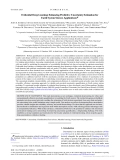Robust quantification of predictive uncertainty is a critical addition needed for machine learning applied to
weather and climate problems to improve the understanding of what is driving prediction sensitivity. Ensembles of ma-
chine learning models provide predictive uncertainty estimates in a conceptually simple way but require multiple models
for training and prediction, increasing computational cost and latency. Parametric deep learning can estimate uncertainty
with one model by predicting the parameters of a probability distribution but does not account for epistemic uncertainty.
Evidential deep learning, a technique that extends parametric deep learning to higher-order distributions, can account for
both aleatoric and epistemic uncertainties with one model. This study compares the uncertainty derived from evidential
neural networks to that obtained from ensembles. Through applications of the classification of winter precipitation type
and regression of surface-layer fluxes, we show evidential deep learning models attaining predictive accuracy rivaling stan-
dard methods while robustly quantifying both sources of uncertainty. We evaluate the uncertainty in terms of how well the
predictions are calibrated and how well the uncertainty correlates with prediction error. Analyses of uncertainty in the
context of the inputs reveal sensitivities to underlying meteorological processes, facilitating interpretation of the models.
The conceptual simplicity, interpretability, and computational efficiency of evidential neural networks make them highly
extensible, offering a promising approach for reliable and practical uncertainty quantification in Earth system science
modeling. To encourage broader adoption of evidential deep learning, we have developed a new Python package, Machine
Integration and Learning for Earth Systems (MILES) group Generalized Uncertainty for Earth System Science (GUESS)
(MILES-GUESS) (https://github.com/ai2es/miles-guess), that enables users to train and evaluate both evidential
